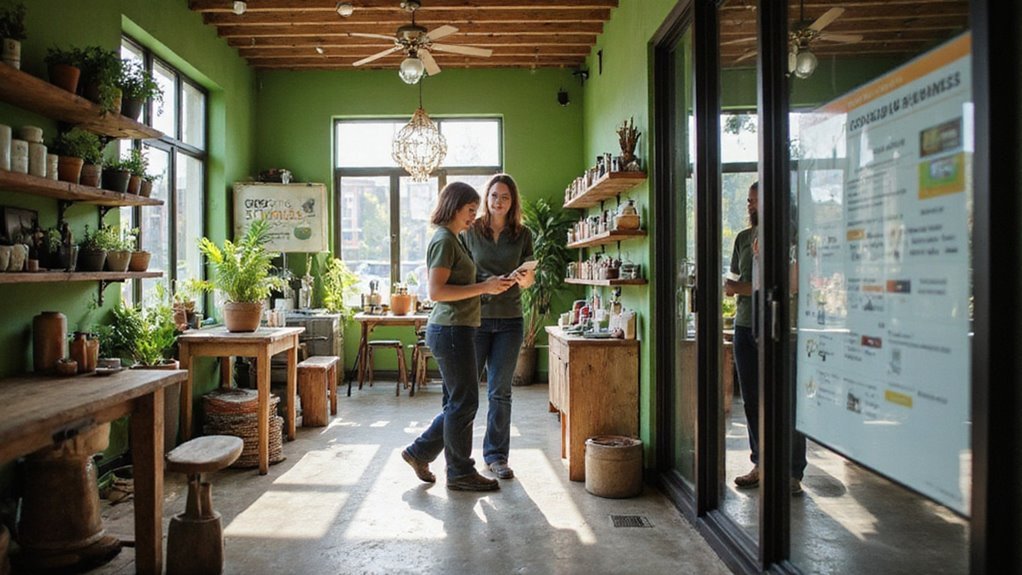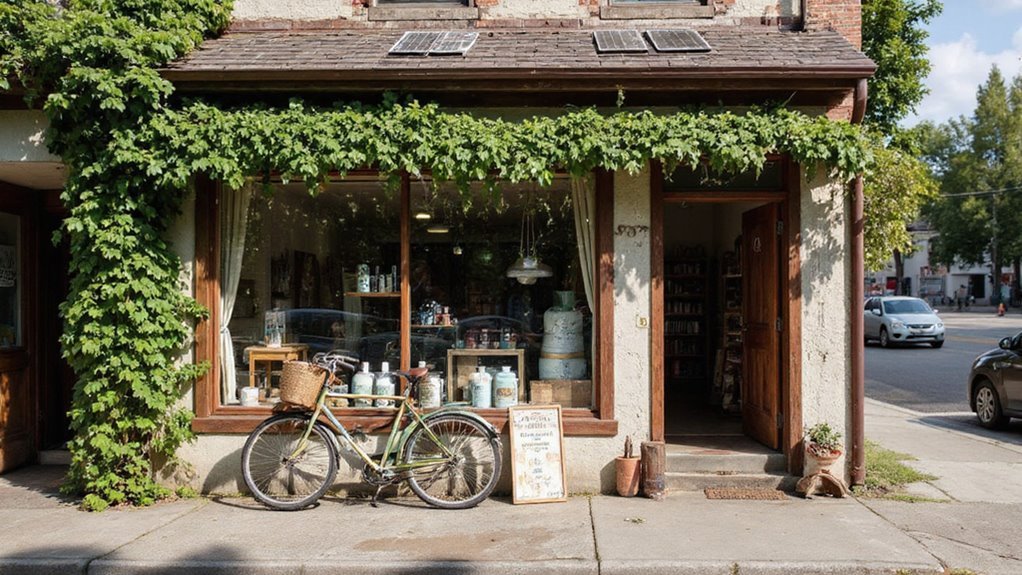If you’re running an eco-conscious retail business, you’re in a great position to snag credit with sweet perks like lower interest rates and flexible terms. Lenders love seeing solid sustainability efforts because they signal lower risk—think about it as a “green” VIP pass to better financing. Nail your ESG profile and grab certifications like B Corp to enhance trust and access exclusive loans or sustainability-linked funding. Stick around, and you’ll find out how to secure and utilize green credit for long-term success.
Key Takeaways
- Eco-conscious retail businesses can access green loans with lower interest rates by funding energy-efficient upgrades or sustainable product lines.
- Strong ESG scores and transparent sustainability reporting increase lender confidence, resulting in favorable credit terms for retail businesses.
- Sustainability-linked loans offer flexible financing where meeting environmental goals can lead to improved loan conditions for eco-friendly retailers.
- Certifications like B Corp and Organic improve business reputation and can reduce risk perception for lenders offering credit.
- Emerging fintech lenders and impact investors favor eco-conscious retailers, often providing easier access to capital with favorable terms.
Understanding the New Landscape of Sustainable Finance

You’ve probably noticed that lenders these moments are paying way more focus on how green and ethical your business is before handing over cash. It’s called ESG—Environmental, Social, and Governance—and it’s like the new PTA report card for your loans, showing how you stack up beyond just profits. Whether you’re assessing the ins and outs of green loans or sustainability-linked loans, or curious about new rules nudging banks toward eco-friendly projects, understanding this shift can turn you from credit newbie to sustainability savvy.
Why Lenders Now Prioritize Sustainability in Credit Decisions
Even though that might seem like lenders are all about the numbers, they’re increasingly paying focus regarding how green your business really is. Sustainability shows lenders that you’re managing risks like energy costs and supply chain hiccups—making your credit profile stronger. In fact, 61% among lenders say they offer better financing terms for eco-conscious companies.
Here’s a quick snapshot:
| Sustainability Factor | Impact regarding Financing |
|---|---|
| Reduced carbon footprint | Lower interest rates |
| Transparent reporting | Higher lender confidence |
| Proven eco-friendly practices | Access toward exclusive credit |
Lenders know sustainable businesses aren’t just saving trees—they’re saving money and future-proofing themselves. So, embracing eco-conscious strategies isn’t just good for the planet; that’s smart business credit too.
Decoding ESG: How Environmental, Social, and Governance Factors Impact Your Business Loan
While securing a business loan used to hinge mostly around your credit score and financial statements, those periods are changing quickly. Nowadays, ESG—Environmental, Social, and Governance factors—play a starring role in sustainable financing. Lenders reward you for environmental responsibility, often offering green business loans with better terms if you show real impact. Here’s how ESG shapes your loan game:
- Lower interest rates often come with strong ESG scores, because they signal a lower-risk, future-proof business.
- Ignoring ESG can bump up your loan costs or make capital harder to snag.
- Impact investing is booming—meaning lenders actively seek businesses like yours that prioritize people and planet alongside profits.
Green Loans vs. Sustainability-Linked Loans: Choosing the Right Capital
Getting your head around sustainable financing means sorting through some new terms—like green loans and sustainability-linked loans—that sound similar but work pretty differently. Green loans fund specific eco-friendly projects, like solar panels or energy-efficient lighting. They usually come with lower interest rates but require you utilize funds strictly for those sustainable initiatives. Sustainability-linked loans, in contrast, offer flexible capital for general business needs but reward you if you meet sustainability targets, like cutting emissions or enhancing renewable energy use. For eco-conscious retailers, choosing the right financing strategy means balancing your immediate project needs with long-term environmental goals. Both provide you a chance to innovate while lowering costs—but picking the right one depends on whether you want precision funding or flexible, goal-driven credit. So, what’s your sustainability flavor?
The Regulatory Environment Pushing Banks Toward Green Investment
Because banks face mounting pressure from new rules and international agreements, they’re leaning hard into green investments like never before. Regulatory bodies now demand climate risk disclosures, so financial institutions must be transparent about their environmental impact. That isn’t just paperwork—it reshapes how money flows. Here’s the deal:
- The SEC requires detailed climate reporting, pushing banks to fund sustainable financing projects.
- Basel Committee guidelines force banks to manage climate risks, making green investment a must.
- International targets like the Paris Agreement urge financial institutions to cut carbon footprints, making eco-friendly practices a smart business move.
If banks ignore these pushes, they risk fines and even worse—reputational bruises. So, if you’re planning your next funding round, keep these shifts in mind in order to ride the green wave successfully.
Exploring the Full Spectrum of Funding for Your Green Business
You’ve got plenty of options when this matter pertains funding your green business, from loans that pay for energy-efficient upgrades to credit tied to hitting sustainability targets. Don’t forget about impact investors and venture capitalists enthusiastic to back mission-driven startups, in addition to fintech lenders who make eco-friendly capital easier for you to access than ever. This is like having a whole buffet of green financing—now you just need to pick what fills your plate best.
Green Business Loans for Tangible Assets and Energy Efficiency
While upgrading your shop’s energy system might sound like a big leap, green business loans make that a whole lot easier—and more affordable—than you might think. These loans focus upon financing tangible assets like energy-efficient equipment, helping you adopt sustainable practices without breaking the bank. Here’s how they operate:
- They often come with lower interest rates and longer repayment terms, making upgrades manageable.
- You can tap into credits like the Advanced Energy Project Credit, slashing costs by up to 30%.
- Energy-efficient improvements can cut your operating costs dramatically—sometimes by 20% or more—boosting your bottom line.
Jumpstart your eco-sustainable initiatives with green business loans and watch your eco-friendly ambitions become smart investments.
Sustainability-Linked Credit for Operational Improvements and Supply Chain Finance
When you tie your business goals with real-world green targets, sustainability-linked credit becomes a powerful tool that rewards you for actually walking the eco-friendly talk. For eco-conscious retailers like you, these loans offer better terms when you hit environmental performance targets, such as cutting carbon emissions or enhancing energy efficiency. Beyond just funding operational improvements, sustainability-linked credit can extend into supply chain finance, encouraging your suppliers to adopt greener practices too. It’s a smart way to shrink your carbon footprint while trimming costs—think lower energy bills and smoother supplier relations. Additionally, lenders love seeing concrete results, so your commitment pays off both environmentally and financially. Embracing such a kind of credit shows you mean business—green business!
Impact Investment and Venture Capital for Mission-Driven Startups and SMEs
Securing funding that aligns with your values can be a game-changing element for any green business. Impact investment and venture capital are no longer just buzzwords—they’re your allies if you’re a mission-driven startup focused on sustainability and eco-friendly practices. Investors look beyond profits and want to see real environmental impact alongside financial returns. Here’s the scoop:
- Impact investment poured about $715 billion globally in 2022, signaling growing interest in green ventures.
- Venture capitalists now chase startups aligned with UN Sustainable Development Goals, keen to back your bold ideas.
- Private equity’s keen on companies showing strong eco-friendly commitment, with 83% planning to invest more.
The Rise of Fintech Lenders for Accessible, Eco-Friendly Capital
As eco-conscious retailers, you know timing is everything—and that’s exactly where fintech lenders come in, offering a quick, tech-savvy way for accessing the capital you need without jumping through endless hoops. These fintech solutions are designed to support green initiatives by blending smart tech with sustainable financing. They use your transactional data to see beyond traditional credit scores, giving you better loan terms derived from your eco-conscious work. Over 70% of small businesses say fintech platforms enhanced their sustainability efforts, proving this isn’t just a fad. So, if you want rapid, accessible capital that actually values your planet-friendly goals, fintech lenders could be your new best friend. Additionally, who wouldn’t enjoy financing that’s green and means less paperwork?
How to Qualify: Building a Bulletproof Case for Lenders
To get lenders in your favor, you’ll want to show them a clear ESG profile that proves your business walks the sustainable talk. Certifications like B Corp or Fair Trade aren’t just fancy badges—they’re powerful proof that you meet serious standards and mean business. Back it all up with solid documents and stories that reveal how your green choices actually enhance profits and keep your business thriving.
Creating Your Company’s ESG Profile: Key Metrics to Measure and Report
Although building an impressive ESG profile might sound like a chore, this is actually your secret weapon for winning over lenders and investors who care about more than just dollars and cents. To create a captivating environmental, social, and governance profile, focus upon clear sustainability reporting that shows real impact. Track and share metrics like:
- Carbon emissions reduction and energy efficiency to highlight your environmental commitment.
- Waste diversion rates, water usage, and employee diversity for social responsibility.
- Transparent governance practices verified by third parties to build lender trust.
Sealing the deal means using data that shows you’re not just green in theory but in practice. After all, 88% of customers love transparency—so go ahead, give lenders the information they crave!
The Strategic Value of Certifications like B-Corp, Fair Trade, and Organic
Three certifications can seriously improve your retail business’s credibility and open doors for funding that might otherwise stay shut: B Corp, Fair Trade, and Organic. Snagging a B-Corp certification means you’ve nailed tough social and environmental standards, proving your business balances profit with purpose. Fair Trade shows you’re committed to ethical standards, ensuring fair wages and safe conditions—plus, customers eat that up. Organic certification? It tells everyone you’re serious about sustainable practices, no synthetic shortcuts allowed. Lenders love these badges because they reduce risk and elevate your reputation. In fact, businesses with such certifications often see sales rise up to 20%. So, if you want to build a bulletproof case for lenders while attracting conscious consumers, chasing these certifications isn’t just smart—it’s strategy dressed up in a green cape.
Documentation and Proof: What Lenders Need to See
When you’re ready for eco-conscious retail business credit, knowing what lenders want to see can feel like decoding a secret recipe—but don’t worry, the process is simpler than one thinks. In order to build a bulletproof case, focus upon strong documentation that highlights your sustainable practices. Here’s what lenders really want:
- A detailed business plan showing how your eco-conscious goals tie directly to your use regarding funds.
- Financial statements—yes, the usual suspects like profit and loss, but sprinkled with evidence of growth through customer demand for green products.
- Proof regarding sustainability, from certifications to partnerships that show you walk the eco-talk.
With these, you’re not just chasing credit—you’re proving your business is a smart, forward-thinking investment. Who knew saving the planet could look so appealing in print?
Showcasing How Sustainable Operations Lead to Greater Profitability and Viability
Since lenders want to see more than just numbers, showcasing how your eco-friendly operations improve profitability can turn your business into a rockstar investment. By adopting sustainable practices, you’re not just saving the planet—you’re slashing operational costs by up to 30%, elevating your bottom line. This isn’t greenwashing; it’s smart business. Additionally, eco-conscious shoppers are flooding your aisles, ready to spend more on brands that align with their values. When you clearly present these facts, lenders see a business with lower risks and higher potential, making financing easier and probably inexpensive. So, don’t just talk about being sustainable—show how your eco-friendly model drives profitability. It’s your secret weapon for snagging the credit you deserve.
Navigating the Application and Approval Journey

Finding the right financial partner—whether they are a bank, credit union, or impact investor—is like matchmaking for your eco-friendly goals. You’ll want to know exactly what they require, from credit scores toward sustainability proof, so your application isn’t left in the “maybe” pile. Additionally, understanding the ESG review and how to negotiate terms will help you grow your business while staying true to your green mission.
Identifying the Right Financial Partner: Banks, Credit Unions, and Impact Investors
Although securing funding for your eco-conscious retail business might seem like navigating a tricky maze, choosing the right financial partner can make the journey much smoother and even enjoyable. Banks and credit unions often offer sustainable financing options like green loans—perfect if you want lower interest rates and local support. Impact investors bring another flair, focusing on businesses that blend profit with purpose, especially b-corp certified businesses. To locate your ideal match, remember these steps:
- Research banks and credit unions that prioritize sustainability and offer incentives.
- Connect with impact investors who value environmental impact as much as financial returns.
- Showcase your eco-credentials clearly to win trust and enhance approval chances.
Picking the right partner turns financing from a headache into a quest worth your while!
Answering Key Questions: What are the requirements for an eco-conscious business loan?
Picking the right financial partner is just the start of your eco-conscious funding expedition. To score eco-conscious business loans, you’ll need a solid business plan showing how your sustainable practices save money and benefit the planet. Lenders want proof you can repay, so be ready to share financial records like revenue and profit margins. They also look for real commitment—not just talk—so certifications like B Corp certification or clear compliance with green standards can make a big difference. Think of it as your eco-resume, showing responsibility in sourcing, waste reduction, and community support. Nail these requirements, and you access funding that rewards what you already do best: running a business that’s good for people and the planet. No magic wand required, just smart planning!
The ESG Due Diligence Process Explained
When you’re going through the ESG due diligence process, you’re basically inviting lenders for a close look at how seriously your business treats its environmental and social responsibilities—and yes, they do mean serious. In eco-conscious retail, that isn’t just a formality; it’s your gateway to funding decisions powered by transparency and innovation. Here’s how you can steer it smoothly:
- Gather proof of your sustainability practices—think energy efficiency records and social responsibility initiatives.
- Set clear benchmarks and regularly report your ESG performance to keep everyone in the loop.
- Show how your policies align with environmental laws and manage risks smartly.
Nailing that process not only earns trust but also enhances your chances of standing out to investors hungry for genuine green commitment.
How to Secure Favorable Terms and Grow Your Enterprise Responsibly
Securing favorable terms for your eco-conscious retail business credit isn’t just about proving you’ve got good numbers—it’s about telling a convincing story that shows lenders you’re serious, smart, and sustainable. Keep your credit score strong—typically above 700—to highlight your reliability. Back your application with clear financial documents like cash flow statements and projections that emphasize your ethical practices and impact. Don’t forget to showcase your commitment to sustainability; lenders love green business loans connected to genuine ESG efforts. Tap into government grants supporting eco-friendly initiatives to enhance your financial appeal. Also, connect with local sustainability-focused lenders or business organizations—they get your vision and can help you steer through finance options. After all, growing responsibly means aligning your mission with your money, making your business future-friendly and financially savvy.
Future-Proofing Your Retail Business with Green Capital
You’ve already seen how green financing can help your business grow, but future-proofing means thinking bigger—connecting your eco-friendly goals directly to long-term success. New funding options and clever financial models are popping up all the time, giving you fresh ways to enhance your market edge and stand out. By tapping into these opportunities, you’re not just staying afloat—you’re steering your retail business toward a greener and more profitable future.
The Connection Between Sustainable Finance and Long-Term Business Success
Although investing in sustainable finance might seem like just another expense initially, this actually sets you up for long-term victories that go beyond saving the planet. When you adopt eco-conscious green initiatives, you enhance your operational efficiency and save with energy bills—sometimes by as much as 25%! Here’s how sustainable finance connects to your success:
- It funds energy-saving upgrades that cut costs and improve profit margins.
- It attracts customers willing to pay more for brands that care about the environment.
- It opens doors to tax credits, giving you extra financial benefits.
Emerging Trends in Green Funding and Innovative Financial Models
When eco-conscious retail businesses tap into the latest green funding trends and innovative financial models, they’re not just chasing a shiny label—they’re future-proofing their operations with smart money moves. Green business loans, impact investing, and crowdfunding are reshaping how eco-conscious startups scale sustainable practices. Additionally, tax credits like those in the Inflation Reduction Act 2023 can seriously ease your upfront costs.
| Funding Type | Benefit | Who It’s Ideal For |
|---|---|---|
| Green Business Loans | Lower interest rates | Growing eco-retailers |
| Impact Investing | Mission-aligned capital | Purpose-driven startups |
| Crowdfunding Platforms | Direct customer engagement | Innovative retail concepts |
| Accounts Receivable Factoring | Immediate cash flow | Businesses with unpaid invoices |
| Tax Credits (e.g., advanced energy) | Reduced project costs | Tech-savvy sustainable brands |
How Entrepreneurs Can Leverage Eco-Conscious Credit to Gain a Market Edge
Since the market’s shifting towards greener choices, accessing eco-conscious credit can give your retail business more than just a feel-good story—it can actually sharpen your competitive advantage. Sustainable financing reveals smart tax credits like the 30% Advanced Energy Project Credit or perks for installing electric vehicle chargers. Here’s how you can win using green business loans:
- Slash upfront costs by claiming energy-efficient commercial building deductions.
- Upgrade your fleet with clean vehicle purchase credits for up to $40,000 back.
- Appeal to eco-minded customers by showcasing your commitment through carbon offset programs.
These moves don’t just enhance your bottom line—they future-proof your business, positioning you as a savvy innovator in a world that’s growing ever more eco-conscious. Ready to lead the green revolution?
Frequently Asked Questions
What Is the Most Ethical Credit Card?
The Wells Fargo Attune Card is your top ethical choice, offering 4% cash back for thrift store and EV charger purchases. This card rewards sustainable spending while supporting eco-friendly initiatives, perfectly aligning with your innovative, green lifestyle.
What Is the Clean Energy Credit for Businesses?
The Clean Energy Credit lets you claim up to 30% back for investments in renewable energy projects like solar or wind. Just verify you meet wage, apprenticeship, and emissions reduction rules to maximize your savings with IRS Form 3468.
What Is Eco Retail?
Eco retail means you sell products made with sustainability in view, like recycled or local materials. With 73% of millennials prioritizing eco-friendly brands, you’re tapping into a booming market craving innovation and ethical choices.
What Is the Green Credit Card?
A green credit card rewards your eco-friendly purchases with cash back or points, enhancing sustainable habits while often charging lower fees. This helps you align spending with your values and support a greener future effortlessly.






